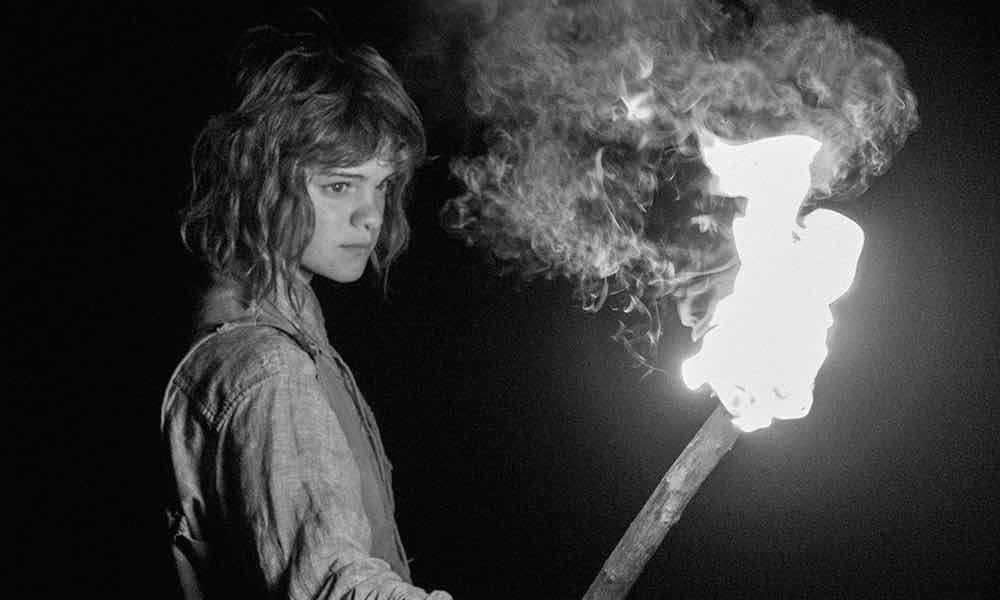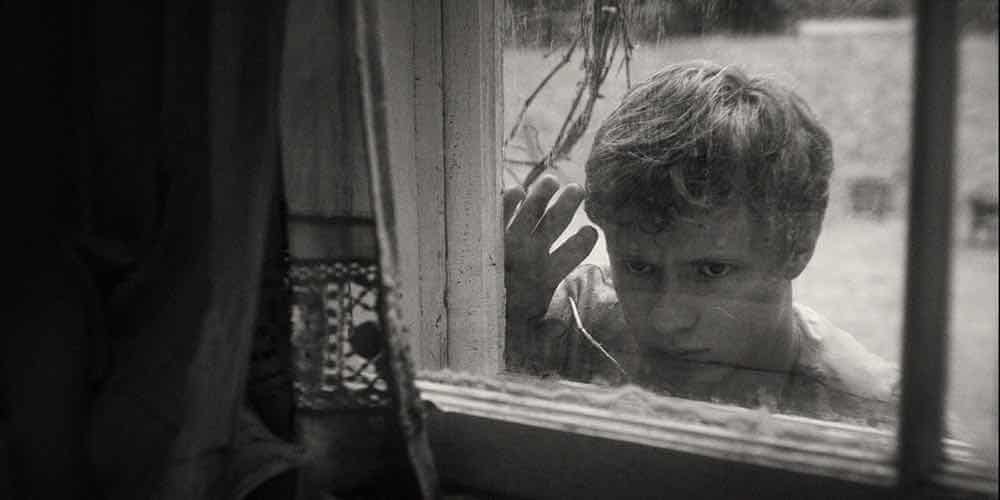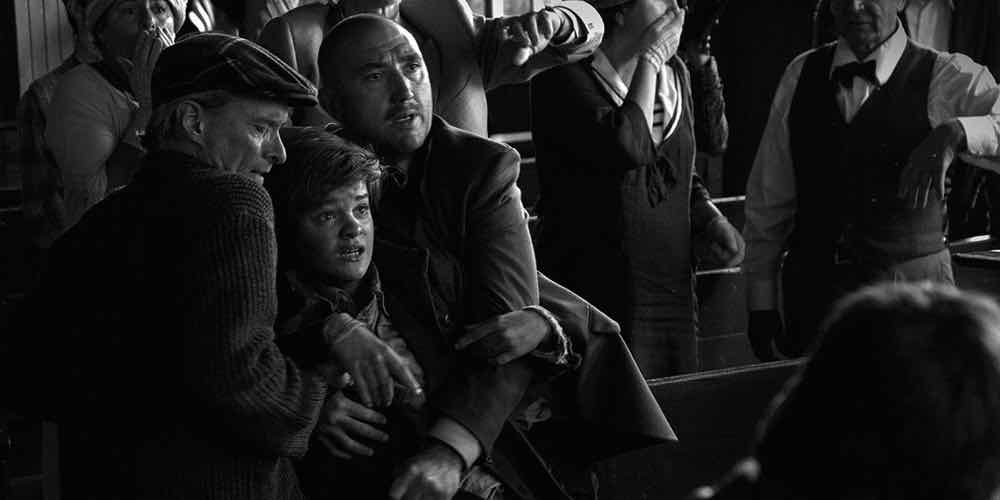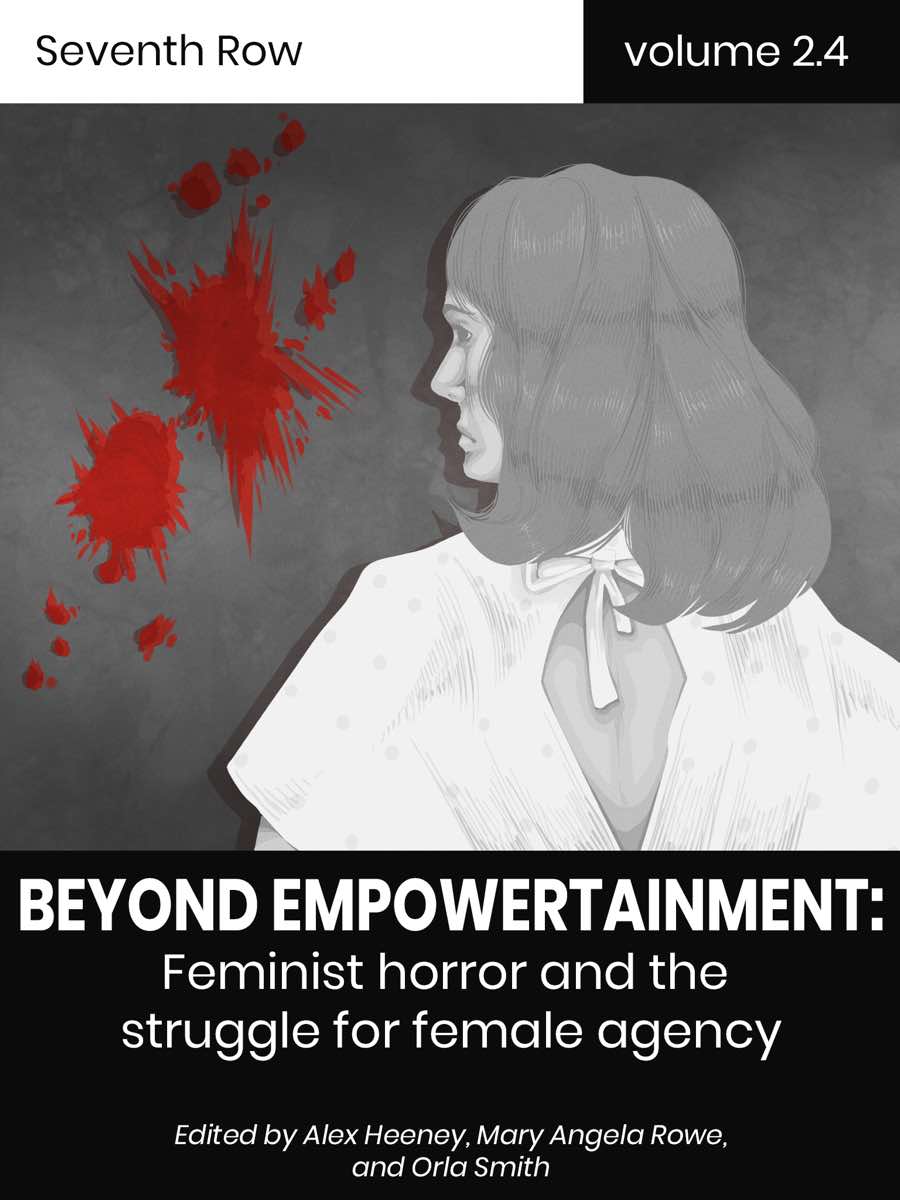Simon Lavoie’s gorgeous adaptation of the popular Québécois novel, The Little Girl Who Was Too Fond of Matches critiques, subverts, and reinvents the Quebec horror film.
This is an excerpt of the essay which appears in the ebook Beyond Empowertainment: Feminist Horror and The Struggle for Female Agency. Get your copy of the ebook here.

Because “Brother” (Marine Johnson) was raised as a boy all her life, she is always struggling to understand herself. She doesn’t know her body, of course, but she also doesn’t know anything of the outside world: her father keeps her brother, “Son,” and her confined to their property. She is a girl with little but her own determination to get her through Simon Lavoie’s latest film, The Little Girl Who Was Too Fond of Matches, based loosely on the novel by French-Canadian Gaétan Soucy — a sensation in Quebec.
[clickToTweet tweet=”As an outsider to the genre, Lavoie proves the ideal overseer to subvert the Quebec horror film.” quote=”As an outsider to the genre, Lavoie proves the ideal overseer to subvert the Quebec horror film.”]
Lavoie’s adaptation is a gothic horror departure for him from last year’s acclaimed political pseudo-documentary, Those Who Make Revolution Halfway Only Dig Their Own Graves. As an outsider to the horror genre, Lavoie turns out to be the ideal overseer to critique and subvert the Quebec horror film. An otherwise simply bizarre detail, like Brother being raised as a boy, is afforded greater meaning in the context of Quebec horror’s history. Unlike Hollywood horror, Quebec horror tends to favour male protagonists. This suggests that Brother’s father was attempting to literally form her into a more traditional Quebec horror lead. Overall, the film plays out with an aura of dread always in the air, giving mundane actions a tinge of danger or uncertainty.
[clickToTweet tweet=”Quebec horror films deal with subjects of sexual repression, religious salvation and damnation, and death.” quote=”Quebec horror films deal with subjects of sexual repression, religious salvation and damnation, and death.”]
Lavoie seems to be keenly aware of the history of Quebec horror cinema, and the Quebec cultural canon that Soucy’s novel exists within. Matches both closely follows and intentionally undercuts these conventions. From the first French-language horror film produced in Quebec, Jean Beaudin’s Le Diable est parmi nous, to New French Extremity co-productions such as Pascal Laugier’s Martyrs, Quebec horror films have always dealt with subjects of sexual repression, religious salvation and damnation, and death. They tend to treasure masculinity, but occasionally challenge it. And they constantly relitigate the urban/rural divide in Quebec.
Want to read the rest of the interview? Order a copy of our forthcoming ebook on feminist horror beyond empowertainment here.
[wcm_restrict]

The rural countryside has often been thought of in Quebec as the essence of Québécois identity, where characters can rediscover orthodox values and themselves. Éric Tessier’s Sur le seuil, a popular Quebec horror film, features a Montrealer travelling to a remote village to gather information. Here, he is confronted with illogical, superstitious, and religious terrors that he can’t understand. But the rural church is the location of the history he requires to put an end to his terrorization. In Le Diable est parmi nous, a group of urban Montrealers are turned into devil worshippers, and the only respite comes when the protagonists venture to an isolated village for a brief period of peace. In Matches, as in films like Robin Aubert’s Saints-Martyrs-des-Damés, this trope is turned on its head. Quebec culture’s valorization of patriarchal, pious principles found in the idyllic countryside is manipulated and critiqued by turning this rural setting into a nightmare.
[clickToTweet tweet=”Lavoie critiques Quebec’s idyllic view of the countryside by turning this setting into a nightmare.” quote=”Lavoie critiques Quebec’s idyllic view of the countryside by turning this setting into a nightmare.”]
In Matches, Lavoie routinely juxtaposes the alluring beauty of the rural setting with the disturbing acts being committed in its midst. For example, Brother is dry humped by her brother early on in the forest near their house. Lavoie’s camera wanders from them to the peaceful forest around them: birds chirping and sunlight twinkling through the leaves. The majority of the film is set in a large, ornately decorated house that is isolated from civilization. It is shot in black-and-white by cinematographer Nicolas Canniccioni. He creates striking and bewitching images with his monochrome RED camera. With brooding shadows that give each image its own dark personality, Canniccioni creates a gothic atmosphere around Brother, fully exploiting how well the monochrome camera can alter mood based on the depth of the blacks and whites in the frame. He isolates her, cushioned by a romantic gloom that instills each shot with a haunting juxtaposition of danger and warmth.
[clickToTweet tweet=”‘Canniccioni alters mood based on the depth of the blacks and whites in the frame.’ -@jake_pitre” quote=”Canniccioni alters mood based on the depth of the blacks and whites in the frame.”]
Unlike most Quebec horror protagonists, Brother grew up in the countryside. But she realizes she must leave it if she hopes to know herself. Her father is a monstrous figure, lumbering around the property — a constant reminder that Brother has no power of her own, even when it comes to her identity. He appears to represent the failures of masculinity and Catholicism in Quebec culture; he’s shown praying emphatically, and tries to exorcise Lazarus (presumably referring to the biblical Lazarus of Bethany, who was resurrected by Jesus) to “get out” of Brother. It’s unclear why he believes the benevolent saint is somehow possessing Brother, though he may simply wish to remove Brother’s goodness. Soon after, he commits suicide.
Son and Brother are thrown into a new, terrifying reality wherein they must make a choice about how to continue. Brother foresees that she must choose one of two paths if she remains. Either become like Son (played with a marked intensity by Antoine L’Écuyer), who takes up his father’s place as an oppressive male figure, because it is the only reality that he knows, through gun-toting aggressive protectiveness. Or, become like the chained-up woman her father kept caged and alone in a shed, the only emblem of femininity Brother knows.

Brother’s journey in the film is harrowing and heartbreaking, but gradually, she moves from being trapped by the moral bankruptcy of her family into a more hopeful future. Recalling other Quebec horror protagonists of the past, she escapes to a nearby village, seeking help from the townspeople gathered for mass at the church. But this fails to liberate her: the priest attempts to control her and tell her what to do. The traditional tenets of salvation, both spiritual and physical, are not viable options for her. She must escape if she has any hope of discovering herself.
[clickToTweet tweet=”‘The traditional tenets of salvation, both spiritual and physical, are not viable options for her.'” quote=”The traditional tenets of salvation, both spiritual and physical, are not viable options for her.”]
Marine Johnson is breathtaking in her first leading role, manifesting the character’s psychosexual damage in palpable but subtle ways. Her eyes are constantly communicating both determination and fear. She has a distinct way of conveying Brother’s compassion and humanity, particularly in her interactions with the chained-up woman. The character has an extremely limited knowledge of the world and is doing her best to understand herself and everything around her. She does this with resources both primal — her animalistic self-protection from the town’s priest — and gentle, knowing what the chained-up woman needs once she is freed. It’s a precarious balance that Johnson makes convincing in every moment.
[clickToTweet tweet=”‘Marine Johnson is breathtaking, subtly manifesting the character’s psychosexual damage.'” quote=”Marine Johnson is breathtaking in her first leading role, manifesting the character’s psychosexual damage in palpable but subtle ways.”]
Lavoie’s only fault may be his occasional refusal to let the story and characters be. He has manipulated the novel’s plot intelligently. But he has also allowed himself too much flexibility to hyper-stylize — just as he did in his previous film. When the moment is begging to breathe, he is prone to cutting away too quickly and cutting the audience’s emotional connection. Elsewhere, he’ll switch the image to something unnecessarily stylized, like his intermittent and abstract flashbacks to Brother’s childhood that obscure more than they reveal.
[clickToTweet tweet=”MATCHES builds hope for the continued strength and creativity of Québécois horror cinema.” quote=”MATCHES builds hope for the continued strength and creativity of Québécois horror cinema.”]
However, it is this same instinct that gives us the stunning tracking shot at the film’s close: the camera follows Johnson through the forest and away from the house. The sequence is showy in a way that recalls the self-satisfied films of Alejandro González Iñárritu. But it serves a narrative purpose as a moving conclusion to Brother’s growth. Likewise, it places the viewer within her agonizing subjectivity more powerfully than at any other point in the film. Thanks to Lavoie’s confident direction, Matches builds hope for the continued strength and creativity of Québécois horror cinema, refreshed by the raw input of genre outsiders.
Read The Seventh Row’s TIFF reviews and interviews here >>
[/wcm_restrict]


